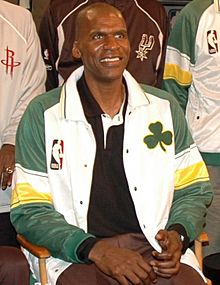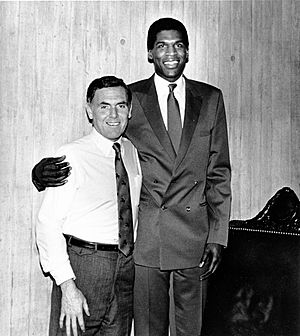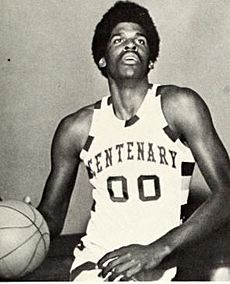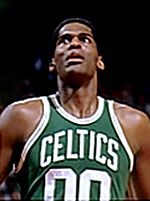Robert Parish facts for kids

Parish in 2005
|
||||||||||||||
| Personal information | ||||||||||||||
|---|---|---|---|---|---|---|---|---|---|---|---|---|---|---|
| Born | August 30, 1953 Shreveport, Louisiana, U.S. |
|||||||||||||
| High school | Woodlawn (Shreveport, Louisiana) | |||||||||||||
| Listed height | 7 ft 1 in (2.16 m) | |||||||||||||
| Listed weight | 244 lb (111 kg) | |||||||||||||
| Career information | ||||||||||||||
| College | Centenary (1972–1976) | |||||||||||||
| NBA Draft | 1976 / Round: 1 / Pick: 8th overall | |||||||||||||
| Selected by the Golden State Warriors | ||||||||||||||
| Pro career | 1976–1997 | |||||||||||||
| Career history | ||||||||||||||
| As player: | ||||||||||||||
| 1976–1980 | Golden State Warriors | |||||||||||||
| 1980–1994 | Boston Celtics | |||||||||||||
| 1994–1996 | Charlotte Hornets | |||||||||||||
| 1996–1997 | Chicago Bulls | |||||||||||||
| As coach: | ||||||||||||||
| 2001 | Maryland Mustangs | |||||||||||||
| Career highlights and awards | ||||||||||||||
As player:
As coach:
|
||||||||||||||
| Career statistics | ||||||||||||||
| Points | 23,334 (14.5 ppg) | |||||||||||||
| Rebounds | 14,715 (9.1 rpg) | |||||||||||||
| Blocks | 2,361 (1.5 bpg) | |||||||||||||
|
Medals
|
||||||||||||||
Robert Lee Parish (born August 30, 1953) is a famous American former professional basketball player. He was a 7-foot-1-inch tall player known as a center. People nicknamed him "the Chief".
Parish played for four different teams in the National Basketball Association (NBA). His career lasted from 1976 to 1997. He spent 14 years with the Boston Celtics. There, he played with other amazing players, Larry Bird and Kevin McHale. They formed one of the best groups of players in NBA history.
During his college years at Centenary College, Robert Parish was a top player. He was drafted three times by professional teams. In 1976, the Golden State Warriors picked him for the NBA. He played four seasons with the Warriors.
In 1980, he moved to the Boston Celtics in a trade. He joined Larry Bird and Kevin McHale. This group was called "The Big Three." They won three NBA championships together. After leaving the Celtics, Parish played for the Charlotte Hornets and the Chicago Bulls. He won another NBA championship with the Bulls in 1997. He retired at age 43.
Robert Parish played in an NBA-record 1,611 games. He played for 21 seasons, which is tied for the third-most in league history. He was known for his strong defense, rebounding, and unique jump shot. He was a nine-time NBA All-Star and a four-time NBA champion. He was also named to the NBA's 50th and 75th anniversary teams. The Celtics retired his jersey number in 1998. Parish was added to the Naismith Basketball Hall of Fame in 2003.
Contents
Robert Parish's Early Life
Robert Parish is the oldest of four children. His parents are Robert Sr. and Ada Parish.
When Robert was in seventh grade, he was already 6 feet 6 inches tall. His junior high coach, Coleman Kidd, saw him and encouraged him to play basketball. Robert had never played basketball before. Coach Kidd would even visit Robert's home if he missed practice. He also gave Robert a basketball to practice with. This is when Robert started wearing his famous jersey number 00. It was the only jersey left on the day they handed out uniforms.
Robert Parish once said, "I really didn't like basketball growing up." He preferred football, baseball, and track. He added, "Coach Coleman would come to my house and take me to practice every day. I give all the credit to him."
Parish went to Woodlawn High School in Shreveport, Louisiana. He played for Coach Ken Ivy. Before that, he attended Union High School, which closed due to desegregation. In 1972, Parish was named All-American, All-State, All-District, and All-City. He led Woodlawn High School to win the 1972 Louisiana High School Athletic Association Class AAAA state championship.
Robert Parish's College Career
Robert Parish chose to attend Centenary College of Louisiana. He said he was very impressed with the coaches there. However, his college career was unusual. This was because of a strict rule from the National Collegiate Athletic Association (NCAA).
The NCAA had a rule about how they checked if new students could play sports. Robert Parish took a test that didn't fit their exact rule. Centenary College changed his score to fit the rule, which they had done for other athletes before. But the NCAA said this was against their rules.
Just before Parish started college, the NCAA said he and four other players couldn't play basketball. The NCAA offered not to punish Centenary if they took back the scholarships. Centenary refused to do this. So, the NCAA put Centenary's basketball program on probation for six years. This meant the team couldn't play in postseason games. Their scores and stats were not included in official NCAA records.
Soon after this decision, the NCAA changed the rule. But they still wouldn't let the Centenary players, including Parish, play. All five players sued the NCAA but lost. This made Parish an "invisible man" in college basketball. He had amazing stats, but the NCAA didn't officially recognize them.
In his four years at Centenary, the Gents team won 87 games and lost 21. They were ranked in the top 20 teams for 14 weeks. Parish averaged 21.6 points and 16.9 rebounds per game. Centenary College recognized his records, but the NCAA did not for many years.
Playing for Team USA in 1975
Between his junior and senior years at Centenary, Parish played for Team USA. This was at the 1975 Pan American Games. Because of his issues with the NCAA, he wasn't first suggested for the team. Centenary College paid for him to try out. Parish made the team and was chosen as captain. He led the team to win a gold medal.
Robert Parish's College Legacy
During his time at Centenary, Parish could have left for professional basketball. He could also have transferred to another college. This would have given him more fame and money. But he chose to stay at Centenary. He said, "I didn't transfer because Centenary did nothing wrong. And I have no regrets. None."
Overall, Parish averaged 21.6 points and 16.9 rebounds in 108 games at Centenary. In his senior year, he averaged 24.8 points and 18 rebounds. Sporting News named him a first-team All-American as a senior.
In 2018, Centenary College asked the NCAA again to recognize Parish's records. The NCAA agreed, and his college stats are now officially in the NCAA Record Book.
Robert Parish's Professional Career
Golden State Warriors (1976–1980)
After college, the Golden State Warriors drafted Robert Parish in the first round of the 1976 NBA draft. He had also been drafted by other teams before. Parish signed with the Warriors. The Warriors had won the NBA championship in 1975. But by the time Parish joined, the team was not doing as well. They missed the playoffs from 1978 to 1980.
Parish said he thought about ending his basketball career early because of all the losing. He felt blamed for the team's struggles. He explained that basketball is a team sport, and he felt the team had too many players thinking only about themselves.
In four seasons with the Warriors, Parish played 307 games. He averaged 13.8 points, 9.5 rebounds, and 1.8 blocks per game.
Boston Celtics (1980–1994)
Before the 1980 NBA draft, the Boston Celtics needed a new center. Their star player, Dave Cowens, had retired. They had Larry Bird ready for his second season. The Celtics had the first pick in the draft.
On June 9, 1980, Celtics president Red Auerbach made a big trade. He sent the first overall pick and another pick to the Warriors. In return, the Celtics got Robert Parish and the Warriors' third overall pick. With that pick, the Celtics chose Kevin McHale. The Warriors then picked Joe Barry Carroll with the first pick.
Parish was happy about the trade. He said it changed his career for the better. He felt like he went from a difficult situation to a great one.

Robert Parish played 14 years with the Celtics, from 1980 to 1994. He won three NBA titles with them. These wins were in 1981, 1984, and 1986. He played alongside Larry Bird and Kevin McHale. This group became known as "The Big Three." They are considered one of the best groups of frontcourt players in NBA history. Parish, Bird, and McHale were all named to the NBA's 50th Anniversary All-Time Team.
Parish got the nickname "the Chief" from his teammate Cedric Maxwell. Maxwell said it was because Parish was quiet and calm, like a character from the movie One Flew Over the Cuckoo's Nest.
Parish was named to the All-NBA Second Team in 1981–82. He was also on the All-NBA Third Team in 1988–89.
Parish holds many Celtics records. He is the team's all-time leader in blocked shots (1,703). He also leads in offensive rebounds (3,450) and defensive rebounds (7,601). In 14 seasons and 1106 games with the Celtics, Parish averaged 16.5 points and 10.0 rebounds per game. He also averaged 1.5 blocks and shot 55.2% from the field.
Charlotte Hornets (1994–1996)
On August 4, 1994, Robert Parish left the Celtics. He was 41 years old. He signed with the Charlotte Hornets. Parish played two seasons with the Hornets. He mostly played as a backup player for Alonzo Mourning.
Chicago Bulls (1996–1997)
On September 25, 1996, Parish signed with the Chicago Bulls. He joined a team that had just won its fourth championship. This team included famous players like Michael Jordan, Scottie Pippen, Toni Kukoč, and Dennis Rodman.
Parish played his last NBA season with the Chicago Bulls in 1996–97. He won his fourth NBA title with them. He played a reserve role, meaning he came off the bench. He stayed in the NBA until he was 43 years old. On August 25, 1997, Parish retired from the NBA.
Career Statistics and Records
As of 2023, Robert Parish holds the record for the most games played in NBA history. He played in 1,611 games. He is also tied for the second-most seasons played in NBA history with 21. As of 2022, he is the oldest player to win an NBA championship. He was 43 years old when he won with the Chicago Bulls in 1997. As of October 2023, he is the third-oldest player to ever play in an NBA game.
In his 1,611 NBA games, Parish averaged 14.5 points, 9.1 rebounds, and 1.5 blocks. He shot 53.7% from the field. In 184 playoff games, Parish averaged 15.3 points, 9.6 rebounds, and 1.7 blocks. He shot 50.6% from the field.
As of 2023, Parish ranks fifth in NBA history for career defensive rebounds with 10,117. He is also fourth in playoff career offensive rebounds with 571.
Robert Parish's Legacy
Parish is remembered for his strong defense, his rebounding skills, and his ability to run the fast break. His teammate and fellow Hall-of-Famer Bill Walton called Parish "probably the best medium-range shooting big man in the history of the game." His special move was his jump shot. The ball would go very high in the air before going into the basket.
Bill Walton said that Robert's game was not about showing off. It was about rebounding, defense, scoring, setting screens, and running the court. He wondered how many centers today do all of that.
Parish was inducted into the Centenary College Athletics Hall of Fame in 1988. He also joined the Louisiana Sports Hall of Fame in 2001. In 2006, he was inducted into the College Basketball Hall of Fame.
In 1996, Parish was chosen as one of the 50 Greatest Players in NBA History. This honor included his teammates Larry Bird, Kevin McHale, Nate Archibald, and Bill Walton. On January 18, 1998, the Celtics retired Parish's famous #00 jersey. Bird and McHale were there for the ceremony. He was inducted into the Basketball Hall of Fame in 2003. In October 2021, Parish was again honored as one of the league's greatest players. He was named to the NBA 75th Anniversary Team. The Athletic ranked him as the 74th greatest player in NBA history.
McHale said that Parish was always there for every practice and every game. He rarely missed anything, including his duties on the court. McHale found his long career and his reliability very impressive.
Robert Parish's Coaching Career
In 2001, Robert Parish became the head coach for the Maryland Mustangs. This was a new team in the United States Basketball League (USBL). Parish led the team to 19 wins and 11 losses. This was the best record in the USBL Northern Division. The team lost in the playoff quarterfinals. Parish was named the USBL Coach of the Year. However, the Mustangs team stopped playing after just one season.
Unlike some of his Celtics teammates, Robert Parish has not taken a coaching or management job in the NBA. His former teammate Kevin McHale tried to hire Parish for the Minnesota Timberwolves. But McHale could not find an open position for him. In 2013, Parish said he thought he could be an NBA coach. He felt that during his last three years as a player, he was already acting like a coach.
As of 2016, Parish worked as a consultant for the Celtics. He helped mentor the team's tall players.
Images for kids
Career Statistics
| Legend | |||||
|---|---|---|---|---|---|
| GP | Games played | GS | Games started | MPG | Minutes per game |
| FG% | Field goal percentage | 3P% | 3-point field goal percentage | FT% | Free throw percentage |
| RPG | Rebounds per game | APG | Assists per game | SPG | Steals per game |
| BPG | Blocks per game | PPG | Points per game | Bold | Career high |
| * | Led NCAA Division I |
College
| Year | Team | GP | GS | MPG | FG% | 3P% | FT% | RPG | APG | SPG | BPG | PPG |
|---|---|---|---|---|---|---|---|---|---|---|---|---|
| 1972–73 | Centenary | 27 | 27 | 32.8 | .579 | – | .610 | 18.7 | .9 | – | – | 23.0 |
| 1973–74 | Centenary | 25 | 25 | 33.6 | .523 | – | .628 | 15.3 | 1.4 | – | – | 19.9 |
| 1974–75 | Centenary | 29 | 29 | 31.0 | .560 | – | .661 | 15.4* | 1.5 | – | – | 18.9 |
| 1975–76 | Centenary | 27 | 27 | 34.8 | .589 | – | .694 | 18.0* | 1.8 | – | – | 24.8 |
| Career | 108 | 108 | 33.0 | .564 | – | .655 | 16.9 | 1.4 | – | – | 21.6 | |
NBA
Regular Season
| Year | Team | GP | GS | MPG | FG% | 3P% | FT% | RPG | APG | SPG | BPG | PPG |
|---|---|---|---|---|---|---|---|---|---|---|---|---|
| 1976–77 | Golden State | 77 | 1 | 18.0 | .503 | — | .708 | 7.1 | 1.0 | 0.7 | 1.2 | 9.1 |
| 1977–78 | Golden State | 82 | 37 | 24.0 | .472 | — | .625 | 8.3 | 1.2 | 1.0 | 1.5 | 12.5 |
| 1978–79 | Golden State | 76 | 75 | 31.7 | .499 | — | .698 | 12.1 | 1.5 | 1.3 | 2.9 | 17.2 |
| 1979–80 | Golden State | 72 | 69 | 29.4 | .507 | .000 | .715 | 10.9 | 1.7 | 0.8 | 1.6 | 17.0 |
| 1980–81† | Boston | 82 | 78 | 28.0 | .545 | .000 | .710 | 9.5 | 1.8 | 1.0 | 2.6 | 18.9 |
| 1981–82 | Boston | 80 | 78 | 31.7 | .542 | — | .710 | 10.8 | 1.8 | 0.8 | 2.4 | 19.9 |
| 1982–83 | Boston | 78 | 76 | 31.5 | .550 | .000 | .698 | 10.6 | 1.8 | 1.0 | 1.9 | 19.3 |
| 1983–84† | Boston | 80 | 79 | 35.8 | .546 | — | .745 | 10.7 | 1.7 | 0.7 | 1.5 | 19.0 |
| 1984–85 | Boston | 79 | 78 | 36.1 | .542 | — | .743 | 10.6 | 1.6 | 0.7 | 1.3 | 17.6 |
| 1985–86† | Boston | 81 | 80 | 31.7 | .549 | — | .731 | 9.5 | 1.8 | 0.8 | 1.4 | 16.1 |
| 1986–87 | Boston | 80 | 80 | 37.4 | .556 | .000 | .735 | 10.6 | 2.2 | 0.8 | 1.8 | 17.5 |
| 1987–88 | Boston | 74 | 73 | 31.2 | .589 | .000 | .734 | 8.5 | 1.6 | 0.7 | 1.1 | 14.3 |
| 1988–89 | Boston | 80 | 80 | 35.5 | .570 | — | .719 | 12.5 | 2.2 | 1.0 | 1.5 | 18.6 |
| 1989–90 | Boston | 79 | 78 | 30.3 | .580 | — | .747 | 10.1 | 1.3 | 0.5 | 0.9 | 15.7 |
| 1990–91 | Boston | 81 | 81 | 30.1 | .598 | .000 | .767 | 10.6 | 0.8 | 0.8 | 1.3 | 14.9 |
| 1991–92 | Boston | 79 | 79 | 28.9 | .535 | — | .772 | 8.9 | 0.9 | 0.9 | 1.2 | 14.1 |
| 1992–93 | Boston | 79 | 79 | 27.2 | .535 | — | .689 | 9.4 | 0.8 | 0.7 | 1.4 | 12.6 |
| 1993–94 | Boston | 74 | 74 | 26.9 | .491 | — | .740 | 7.3 | 1.1 | 0.6 | 1.3 | 11.7 |
| 1994–95 | Charlotte | 81 | 4 | 16.7 | .427 | — | .703 | 4.3 | 0.5 | 0.3 | 0.4 | 4.8 |
| 1995–96 | Charlotte | 74 | 34 | 14.7 | .498 | — | .704 | 4.1 | 0.4 | 0.3 | 0.7 | 3.9 |
| 1996–97† | Chicago | 43 | 3 | 9.4 | .490 | — | .677 | 2.1 | 0.5 | 0.1 | 0.4 | 3.7 |
| Career | 1,611 |
1,320 | 28.4 | .537 | .000 | .721 | 9.1 | 1.4 | 0.8 | 1.5 | 14.5 | |
| All-Star | 9 | 1 | 15.8 | .529 | — | .667 | 5.9 | 0.9 | 0.4 | 0.9 | 9.6 | |
Playoffs
| Year | Team | GP | GS | MPG | FG% | 3P% | FT% | RPG | APG | SPG | BPG | PPG |
|---|---|---|---|---|---|---|---|---|---|---|---|---|
| 1977 | Golden State | 10 | 0 | 23.9 | .481 | — | .654 | 10.3 | 1.1 | 0.7 | 1.1 | 12.1 |
| 1981† | Boston | 17 | 17 | 28.9 | .493 | .000 | .672 | 8.6 | 1.1 | 1.2 | 2.3 | 15.0 |
| 1982 | Boston | 12 | 12 | 35.5 | .488 | .000 | .680 | 11.3 | 1.5 | 0.4 | 4.0 | 21.3 |
| 1983 | Boston | 7 | 7 | 35.6 | .483 | .000 | .850 | 10.6 | 1.3 | 0.7 | 1.3 | 14.7 |
| 1984† | Boston | 23 | 23 | 37.8 | .478 | .000 | .646 | 10.8 | 1.2 | 1.0 | 1.8 | 14.9 |
| 1985 | Boston | 21 | 21 | 38.2 | .493 | .000 | .784 | 10.4 | 1.5 | 1.0 | 1.6 | 17.1 |
| 1986† | Boston | 18 | 18 | 32.8 | .471 | .000 | .652 | 8.8 | 1.4 | 0.5 | 1.7 | 15.0 |
| 1987 | Boston | 21 | 21 | 35.0 | .567 | .000 | .767 | 9.4 | 1.3 | 0.9 | 1.7 | 18.0 |
| 1988 | Boston | 17 | 17 | 36.8 | .532 | .000 | .820 | 9.9 | 1.2 | 0.6 | 1.1 | 14.7 |
| 1989 | Boston | 3 | 3 | 37.3 | .455 | .000 | .778 | 8.7 | 2.0 | 1.3 | 0.7 | 15.7 |
| 1990 | Boston | 5 | 5 | 34.0 | .574 | .000 | .944 | 10.0 | 2.6 | 1.0 | 1.4 | 15.8 |
| 1991 | Boston | 10 | 10 | 29.6 | .598 | .000 | .689 | 9.2 | 0.6 | 0.8 | 0.7 | 15.8 |
| 1992 | Boston | 10 | 10 | 33.5 | .495 | .000 | .714 | 9.7 | 1.4 | 0.7 | 1.5 | 12.0 |
| 1993 | Boston | 4 | 4 | 36.5 | .544 | .000 | .857 | 9.5 | 1.3 | 0.2 | 1.5 | 17.0 |
| 1995 | Charlotte | 4 | 0 | 17.8 | .545 | .000 | .400 | 2.3 | 0.3 | 0.0 | 0.8 | 3.5 |
| 1997† | Chicago | 2 | 0 | 9.0 | .143 | .000 | .000 | 2.0 | 0.0 | 0.0 | 1.5 | 1.0 |
| Career | 184 | 168 | 33.6 | .506 | .000 | .722 | 9.6 | 1.3 | 0.8 | 1.7 | 15.3 | |
See also
 In Spanish: Robert Parish para niños
In Spanish: Robert Parish para niños
- List of NBA career games played leaders
- List of NBA career scoring leaders
- List of NBA career rebounding leaders
- List of NBA career blocks leaders
- List of NBA career turnovers leaders
- List of NBA career personal fouls leaders
- List of NBA career minutes played leaders
- List of NBA career playoff rebounding leaders
- List of NBA career playoff blocks leaders
- List of NBA career playoff turnovers leaders
- List of NBA career playoff games played leaders
- List of NBA single-game rebounding leaders
- List of NBA single-game blocks leaders
- List of NBA seasons played leaders
- List of oldest and youngest NBA players




